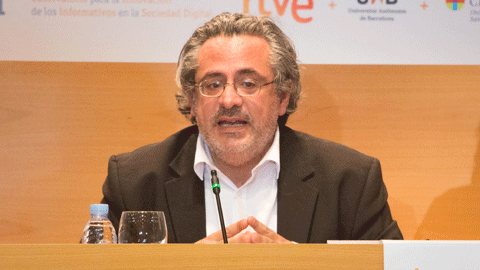"There is a need for journalists who can verify and validate the images"

19/12/2016
The Observatory for Innovation in News in the Digital Society (Oi2) organised the seminar "News in the Digital Era" which took place in November at the UAB. This is the second meeting of this type organised by the platform, which includes the Spanish radio and television station RTVE, the UAB and the CEU San Pablo University in Madrid. Participating in the debate on the phenomenon of citizen journalism was Marc Saikali, director of France 24, a news channel broadcasting in French, English and Arabic. Starting in 2017, France 24 will also begin to offer news in Spanish.
Is it now possible to act like a journalist simply by using a mobile phone?
Today, everyone has a phone and can take pictures, and anyone can be anywhere. The first images of all news are made by amateurs who are where the news happens before the professional journalist can get there. However, that is not enough. Not just anyone can declare themselves a journalist. The social networks are full of everything: false images, false information and false events. I am thoroughly convinced that there is a need for journalists who verify and validate these images.
Has this become a problem for media channels such as France 24?
Of course it has. That is why sometimes I prefer not to go too fast with the news in order to have time to verify the sources before offering false information. Because the effects of a false news for an international television channel like ours can burn us out. I prefer taking the time to verify the information that reaches me.
At the same time, there is terrible pressure to publish news as quickly as possible.
Yes, of course, the pressure of thinking that the last one to announce a news cannot be considered a proper information channel. However, being the last and taking the necessary time to verify the information are two different things. We contrast news and do it quickly because we have excellent teams who work with reliable sources. For example, now there is a 50% chance to be mistaken when announcing the results of a survey. We are very cautious with polls and do not give out the first data we get.
Journalists here pay a lot of attention to Twitter. Does the same happen in France?
This is happening everywhere. Even before there is an image by an amateur, the information arrives through a tweet. Years ago, when I first started working as a journalist, some twenty to thirty minutes would pass between the occurrence of an event and the sending of the first news, image and sound. Now it's instant, and the first thing we receive is always a tweet.
What are the benefits and the risks of being informed through social networks?
Obviously, we must live in the today and with the current advances. The social networks are a gold mine of information; we will not close down the internet, like in North Korea... However, social networks are only one of the sources of information existing. There are things which should be taught in schools: analysing information and images to know whether they are true, where the news comes from, who published it, what other things this source publishes, on what date it was published, etc.
Therefore, in a society in which communication is so important, people should become familiar with journalism already in childhood.
That's why in France we celebrate Press Week at schools. We have reached an agreement with the French Ministry of National Education to put into practice a programme called "Info ou Intox" (Information or Intoxication). We show the students images and discover that they are completely false and talk about why. So that they do not fall for the false news.
There are rumours that Donald Trump's campaign benefited from the spread of false news through the social networks. Has that created a dangerous precedent which can be imitated?
This issue is not just black and white. Everyone uses the social networks for their own benefit, especially in electoral campaigns. Donald Trump has benefited from a series of things; he played against the establishment and today everyone hates the establishment. One must be very cautious of populist and extremist currents which believe that all journalists, politicians and economic leaders are corrupt and against the people. It's false. There are politicians who are not corrupt, not all journalists are idiots and not all business owners are exploiters. And not all normal people are angels, either. Surely, Trump also benefited from the rejection towards a system of political families: the Bush family, the Clinton family, etc.
What are the possibilities of right-wing politician Marine Le Pen in France?
You mean passing the second round [of the 2017 presidential elections]? It's not impossible. Winning the elections is another thing. France is not the United States. As Dominique de Villepin said to the UN, "listen to what an old nation is telling you". France, Spain and Italy are old nations with an extremely rich and strong history, nations which have suffered and are familiar with the price of extremism.
Can one benefit from populist or false messages?
Not necessarily. Le Pen appeals to the most basic emotions of the people. It is obvious that immigration needs to be regulated, but going so far as to kicking everyone out, closing borders... or eliminating the Euro! There are people who think the Euro made everything more expensive. Regardless of that, can you imagine the economic decay of leaving the Eurozone?
More information:
OI2